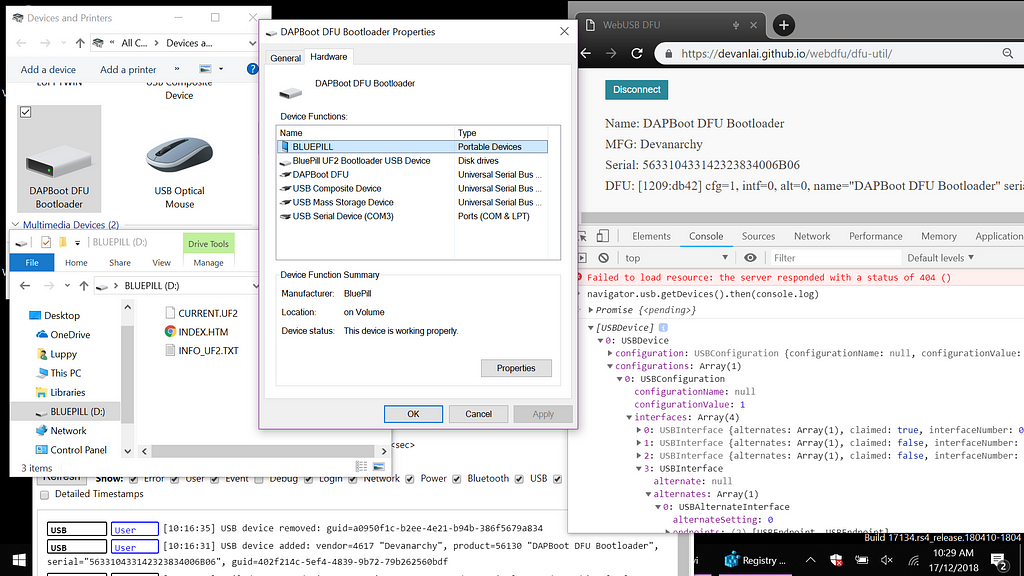
- #Stm usb vcp drivers for mac how to#
- #Stm usb vcp drivers for mac mac os x#
- #Stm usb vcp drivers for mac serial#
- #Stm usb vcp drivers for mac driver#
bin file of his implementation for everyone to pour over. This guy added SWD to openocd for stm32 programming and included his.
#Stm usb vcp drivers for mac how to#
The reference manual shows you how to set up the interface, including the sequence you have to clock in to turn the jtag pins into swd pins.ģ. I did stumble upon a goldmine of info this evening, possibly enough to put something together 😛ġ. The idea of setting up a small python script to feed into a small 8-bit micro to program any SWD enabled chip seems excellent. The interface has little-to-no documentation lying around and I can’t seem to figure out why because it seems so damned convenient. IMAC:peterharrison$ sudo kextload /System/Library/Extensions/FTDIUSBSerialDriver.kext/ IMAC:peterharrison$ sudo kextunload /System/Library/Extensions/FTDIUSBSerialDriver.kext/

For those of you who are proud of how long your Mac has gone without a restart you might want to manually unload the kernel drivers and then reload them with the following commands:
#Stm usb vcp drivers for mac serial#
If you then restart your Mac, you should find that only one serial port is listed for this device and Rowley Crossworks, if you have it, can recognise the JTAG adaptor. When you have it in an editor, look for this section:ĭelete it, leaving the similar ‘B’ section alone. If you delete this file, all your FTDI serial devices will stop working when you next restart your computer. You may need to set permissions or do it from the command line with sudo. It is a text file so it can be edited with any suitable editor. System/Library/Extensions/FTDIUSBSerialDriver.kext
#Stm usb vcp drivers for mac driver#
If you have a look on your Mac, you should be able to find the FTDI driver property list file here: To make all this work properly, you have to tell the kernel to leave the first port alone. To my surprise, it turns out that the Leopard installation actually knows all about the Olimex adaptor and describes it as having two serial ports so they both get turned on. Since the kernel had seen the device before Crossworks had a chance to see the it, it had nabbed them and turned on both serial ports thus preventing it from behaving like a JTAG adaptor. you can find these ports with a command like this:Ĭrw-rw-rw- 1 root wheel 10, 114 8 May 19:10 /dev/tty.usbserial-000014FDAĬrw-rw-rw- 1 root wheel 10, 114 8 May 19:10 /dev/tty.usbserial-000014FDBĬrw-rw-rw- 1 root wheel 10, 100 8 May 19:18 /dev/tty.usbserial-FTD3TMCH Indeed, when I looked at the available serial ports, I could see two associated with the JTAG adaptor.
#Stm usb vcp drivers for mac mac os x#
Anyway, Mac OS X Leopard has drivers built in for these so that wasn’t the problem. I expect the software uses the serial port to waggle the port control lines to talk to the JTAG port. This type of JTAG adaptor is based on the FTDI USB to serial chip. that was when I came across the other pointer on the web.

Anyway, the ’good’ cable was used and the adaptor plugged back into the Mac. A bit of checking shows that the USB 3 standard has a specific cable requirement. YOu see plenty of cables marked up these days as USB 2.0 standard but I had rather assumed this was just a way to get people to buy new cables.

This is a bit mystifying as I had seen no problems with the ‘bad’ cable before – it simply would not work with the Olimex adaptor. I had the JTAG adaptor plugged into a PC and discovered, quite by chance that it would work with one cable but not the other. There are two issues.įirst, it seems that one of my USB leads is out of spec somehow. I wasted ages looking for solutions on the web, unplugging it, plugging it back in, and I was beginning to believe it was broken when I cam across a couple of pointers to the problem. I tried all sorts but Crossworks stubbornly refused to open the JTAG adaptor.

When I plugged it in to the Mac, Crossworks just would not talk to it. I was quite excited when it arrived and hurried to get it set up. JTAG is fast for flash programming and pretty well a one-touch solution in Crossworks. It looks pretty useful and is supported by the openOCD project as well as Rowley Crossworks. This is a multi purpose device that provides you with a USB JTAG interface to the ARM, a USB serial port and a power supply for your target board. As a bit of a backup to the whole bootloader thing, I bought an Olimex ARM-USB-OCD JTAG adaptor.


 0 kommentar(er)
0 kommentar(er)
